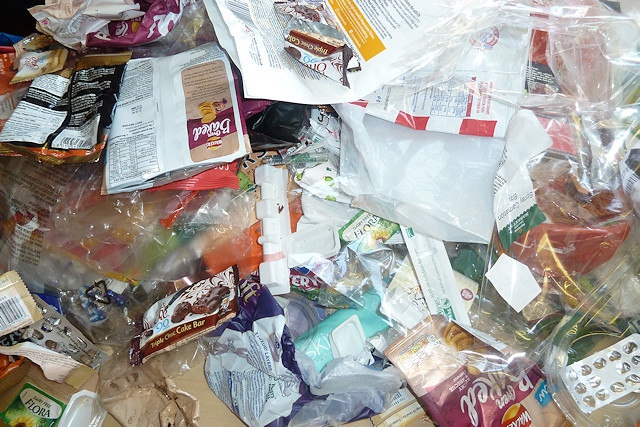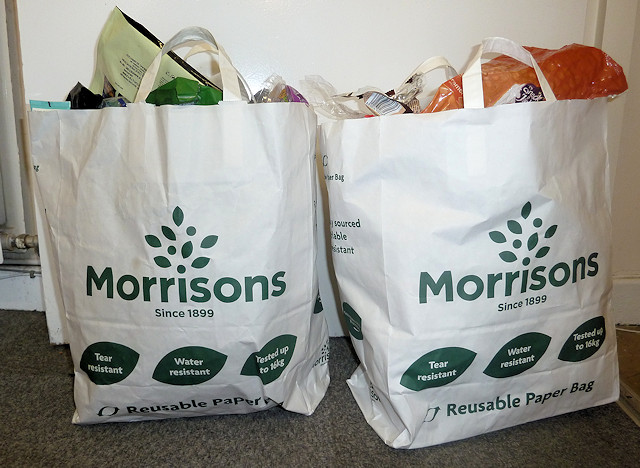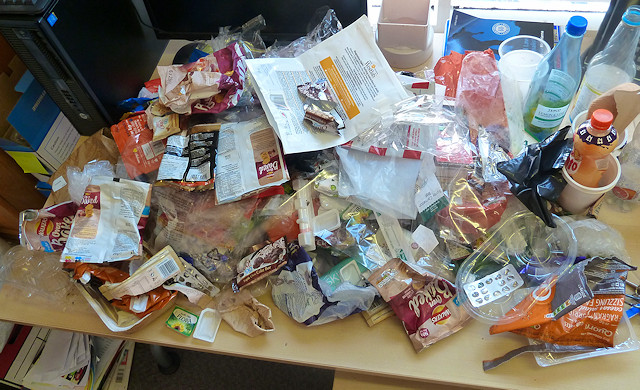What I learnt from Plastic-Free July
Date published: 03 August 2019

Single-use plastic collected over July
Rochdale Online reporter Michelle Kight, 27, took up the Plastic Free July challenge to see how easy it is to live without disposable plastic and what waste she personally contributes to the environment.
Here’s how she found it.
Let me preface this by saying I’ve considered myself to be a bit of an eco-warrior for some time: I don’t remember the last time I ate meat, I recycle everything I can, clingfilm isn’t allowed in the house and I buy refills where possible.
Preserving our planet has always been important to me: any recyclable plastic that isn’t a plastic bottle is taken to my family’s recycling bins in Rossendale, as I can’t recycle them here in Rochdale, I’m signed up to various Terracycle schemes for recycling crisp packets and other hard-to-recycle items, and I always have a cloth bag for unexpected purchases.
Of course, I haven’t always been this way. I first started looking at my single-use plastic consumption after watching the Netflix documentary ‘A Plastic Ocean’ in December 2017, and reading the book ‘Zero Waste Home’ by Bea Johnson.
The horrifying effects of single-use plastics have been realised in recent years after shocking images of plastic-choked oceans and piles of waste sent abroad for recycling surfaced: the scourge of this versatile product being shouted about from the rooftops by the likes of Sir David Attenborough and Hugh Fearnley-Whittingstall.
Single-use plastic has definitely become public enemy number one.

To help our efforts, the Plastic Free July campaign asks people to commit to reducing their consumption of plastic for the whole month, with a record-breaking 230 million people having participated this year.
Having already cut down on my plastic waste, how hard could Plastic-Free July be? I mean, really?
As a household of two adults, no children and four cats, my partner and I put all of our bins out once every six weeks.
I decided that the only way to see where I could improve was to sign up to the campaign, and keep every item of single-use plastic for the next 31 days.
I kept everything in a reusable paper bag in the kitchen cupboard at home. At the start of the month, we didn’t have any single-use plastic bags or 10p bags for life (both are designated for cleaning the cat litter) and all our reusable bags for life were either needed or in use.
On the first morning of the month, I quickly noticed that many items in my morning routine were made of single-use plastic: my toothpaste, blister packs of medication, even my morning coffee came from a glass jar with a plastic lid and a layer plastic-foil to keep it fresh.
Maybe this was going to be tougher than I had anticipated.
The immediate thing I noticed throughout the month was the bulk of my plastic was made up of food items. Just 10% of the plastic collected was from elsewhere in the house, including bathroom waste (a toilet roll wrapper, two empty toiletry tubes), post and bags of cat food.
I expected the bathroom waste to be low: I use a bamboo toothbrush and a menstrual cup, my deodorant is refillable, I rarely wear makeup and there are many colourful bars of soap, shampoo and even conditioner on the shelves.
The remaining 90% produced in the kitchen came as somewhat of a surprise because I do buy refills (locally!) where I can for cleaning, laundry and staple ingredients.
My habit of snacking and buying reduced-price bread immediately apparent – with the paper bag largely consisting of crisp packets, snack bars, salad bags, ‘crinkly’ plastic from supermarket bread, and plastic seals around jars.

As the month went on, I reluctantly dug out a second paper bag, as I clearly wasn’t doing as well I thought I would – my experiment was changing, and I realised I may be better off continuing to collect single-use plastic and go from there.
Ironically, during a month where I was trying to use less plastic, I feel like I used more as some items that found their way into my bags weren’t a usual thing for me, such as a couple of ready meal trays.
Now that the month is over, I have sorted through everything collected, and the results have surprised me.
Over the 31 days of July, I had managed to collect 183 individual bits of plastic, with around half of this being suitable for recycling in one form or another.
I do feel disappointed that my number was so high (approximately double what I expected), but I’m pleased I took part in the campaign – I know which items have bumped up the total, so I can work on finding alternatives.
Whilst I have made a lot of changes, there is still some way to go: the challenge has also highlighted which areas of my life need some work, and where I am doing well. Of course, there are some areas where plastic will always be used – medication for one – and many manufacturers are in the process of finding alternative products, such as food packaging.
The importance is in reducing what we do use, wherever we can.
In a way, I’m a little sad to say goodbye to my storage bags, but I’m looking forward to continuing this journey, ready for next year’s campaign.
Do you have a story for us?
Let us know by emailing news@rochdaleonline.co.uk
All contact will be treated in confidence.
Most Viewed News Stories
To contact the Rochdale Online news desk, email news@rochdaleonline.co.uk or visit our news submission page.
To get the latest news on your desktop or mobile, follow Rochdale Online on Twitter and Facebook.

